Understanding Mucking in Poker: Strategies and Insights
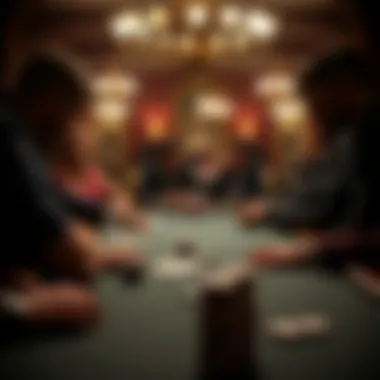
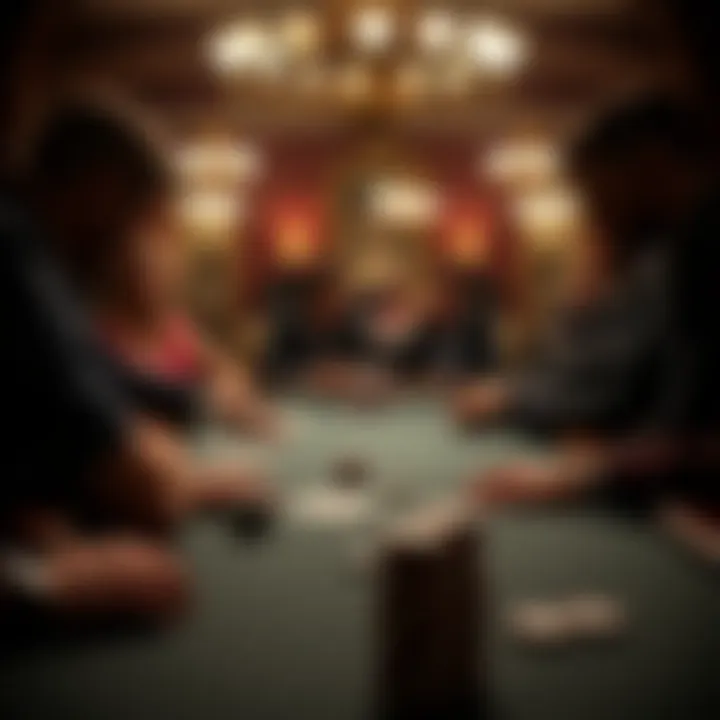
Intro
In the intricate dance of poker, where every move holds weight, mucking often takes a backseat in discussions. However, it’s a concept that can pivot the course of a game. When players choose to muck, they throw away their cards without revealing them to their opponents. But mucking goes beyond mere discarding; it carries implications for strategy, psychology, and even the unfolding dynamics of the game.
Understanding mucking isn't just about knowing when to fold. It’s about grasping how players leverage this action to protect their strategies, maintain a poker face, and manage risk. Whether you are seated at a high-stakes poker table or simply engaging in a friendly home game, the art of mucking plays a pivotal role. In this article, we will unravel its various facets, from tactical considerations to its psychological dimensions, ultimately shedding light on how mucking influences both individual choices and the collective atmosphere at the table.
Betting Strategies
Mucking intertwines with betting strategies in myriad ways. How players choose to engage, or disengage through mucking, can tilt the odds in their favor. The interplay between mucking and betting informs not just personal tactics but also broader game strategies.
Understanding Odds and Payouts
A keen grasp of odds is fundamental in poker. Players must comprehend the mathematical edge they can gain and how mucking influences their standing. Each decision to muck can shape perceived odds, impacting opponents' reads and reactions. For instance, if a player consistently mucks strong hands, they might foster a reputation for being overly cautious, which could encourage riskier play from opponents.
- When to muck:
- If the pot odds don't justify a call
- To maintain a deceptive image
Moreover, understanding payout structures in poker tournaments also shapes mucking behavior. Sometimes, preserving your stack by mucking is more strategic than risking it all on a subpar hand.
Advanced Betting Techniques
More seasoned players might delve into advanced techniques that integrate mucking into their strategy. Consider the tactics of semi-bluffing, where a player may represent strength while having a weak hand, only to muck if the situation turns unfavorable. This technique is a play of psychological warfare, bluffing opponents into folding while keeping one’s chips intact.
"A good poker face can hide a multitude of sins, but knowing when to muck can be a gift that keeps on giving."
In these high-stakes scenarios, players often combine mucking with reading their opponents' body language or betting patterns, discerning when it's best to hold their cards close or discard them altogether.
Poker Insights
Diving deeper into the essence of mucking requires a broader understanding of poker itself. Various gaming formats and methods of mucking play a role in shaping a player’s experience.
Poker Variants and Their Strategies
Not all poker formats treat mucking the same. In traditional Texas Hold'em, for instance, mucking a losing hand after the river can serve a dual purpose: conserving chips and preserving the player's image at the table. In contrast, in a game like Omaha, a player might choose to muck a weak hand to avoid giving any clues for future rounds, as the community cards can dramatically change dynamics.
- Common poker variants and their mucking tendencies:
- Texas Hold'em: Mucking to maintain stance
- Omaha: Mucking to avoid table reads
Key Skills for Successful Poker Play
Navigating the world of mucking demands a collection of skills. Patience when to muck is crucial, as is the ability to assess situations on the fly. Emotional discipline allows a player to maintain focus and avoid unnecessary risk. Ultimately, mastering mucking enhances not just individual tactics but contributes to the richness of the game dynamic.
For more extensive coverage on poker strategies, consider visiting resources like Wikipedia, Britannica, or discussions on Reddit to expand your knowledge further.
The Fundamentals of Mucking
Mucking, in the realm of poker, plays a fundamental role as it shapes both the player's decision-making process and the overall dynamics of the game. Understanding the core elements of mucking is crucial for anyone who wishes to elevate their poker skills. This article aims to dissect the concept, exploring its significance in effectively managing hands and making sound strategic decisions.
Defining Mucking in Poker
Mucking, simply put, refers to the act of discarding one’s hand without revealing it to the table. It’s a part of the gameplay that goes beyond just throwing your cards away. Mucking is a delicate balance between letting go of a hand that no longer serves a strategic purpose and protecting the information regarding your playing style from opponents. This action becomes especially essential when stakes are high, making it imperative for players to understand not only when to muck but why it is often a necessary decision.
The act of mucking can prevent players from showing weakness, while at the same time helps in maintaining a competitive edge. When a player chooses to muck, they can avoid displaying their cards, thereby keeping their opponents guessing, which is an art unto itself.
Types of Mucking
Mucking can be categorized into three types: involuntary, voluntary, and strategic. Each type serves different purposes in gameplay and offers distinct advantages and disadvantages, making it critical to recognize their differences.
Involuntary Mucking
Involuntary mucking occurs unintentionally, often as a result of miscommunication or misunderstanding during gameplay. For example, a player might mistakenly throw their cards into the muck pile while believing they were still in the game, usually after losing track of the round or the bets made. This type of mucking may lead to frustrating situations, particularly when players lose cards that could have been played to their advantage.
This aspect of mucking highlights a key characteristic: it often involves emotional reactions, like regret and frustration, after a realization dawns upon the player regarding their discarded hand. While this type of mucking is not generally considered beneficial, understanding how these mishaps occur can certainly enhance a player's live game awareness and attentiveness.
Voluntary Mucking
On the other hand, voluntary mucking is a conscious decision made by a player when they conclude that their hand is no longer viable in the current context. This decision springs from a variety of scenarios – maybe an opponent's bet is too intimidating, or the player’s own analysis of potential outcomes reveals unsatisfactory prospects.
A leading characteristic of voluntary mucking is its strategic nature. It often comes with the recognition that holding onto certain cards would be a mistake, thus saving chips and mental energy in a game that can be both mentally taxing and financially challenging. The advantage here is clear: players gain a sense of control over their actions and avoid future losses by freeing themselves from unpromising situations.


Strategic Mucking
Lastly, we have strategic mucking, which presents an entirely different approach. This form of mucking often ties directly to a player’s overall strategy in a session. A player may intentionally muck a winning hand to create an image of weakness, potentially stirring opponents into a false sense of confidence.
The uniqueness of strategic mucking lies in its ability to manipulate the perceptions of others at the table. A player can invoke confusion and mislead opponents into making poor bets. The advantage of this is that it sets a foundation for potential bluffs and riskier plays later in the game. However, strategic mucking is not without its risks; if not applied judiciously, players might end up establishing a predictable pattern, compromising their strategic flexibility over time.
In essence, mucking is more than a mere discard; it’s a complex element of poker that players navigate to preserve their competitive edge. Understanding the different types of mucking can greatly contribute to enhancing one’s overall gameplay and decision-making skills in poker.
Whether it’s avoiding mishaps with involuntary mucking, embracing the clarity that comes with voluntary mucking, or engaging in the mind games strategic mucking encourages, each aspect reinforces the importance of this concept in poker.
The Role of Mucking in Gameplay
Mucking, while it may sound like a minor detail in the grand poker scheme, carries significant weight in shaping gameplay. Understanding the role mucking plays can be a game changer. It’s not just about tossing away cards; it’s about strategic thinking, emotional management, and the broader picture of poker dynamics. Players need to grasp when it’s beneficial to muck, how it affects not just their own game but also the patterns and behaviors of their opponents.
Among poker players, there’s an unspoken agreement that mucking is more than a mere act; it’s an art. Timing is key, as making the right muck at the appropriate moment can save you chips and, more importantly, your sanity. Benefits extend beyond individual performance; it also allows players to maintain a level of unpredictability that is critical in high-stakes games.
To delve deeper, let’s explore the crucial situations of when to muck.
When to Muck
Knowing when to muck can often separate the rookies from the seasoned pros. Factors to consider include:
- Hand Strength: If you’re dealt a pair of twos when the table’s heating up with strong betting, it might be best to cut your losses. In this scenario, mucking is not surrender but a wise protective measure.
- Player Reads: Watching your opponents can give clues. If they’re betting aggressively, and your hand feels more like a sinking ship than a sturdy vessel, discard those cards and regroup your thinking.
- Pot Odds: Assess what you’re investing versus the return potential. If the math doesn’t work out in your favor, mucking is a viable option.
Many players experience a mental block at the idea of mucking good hands, fearing they might be letting go of potential strength. However, experiencing the art of letting go is oftentimes empowering, contributing to a refined game.
Consequences of Mucking
When players decide to muck, the consequences ripple through the gameplay and impact both their strategy and the overall psychology at the table.
Impact on Hand Reading
Mucking, particularly in poker, can speak volumes about the strategy in use. When one player continuously refuses to show their cards while mucking, it creates a cloud of mystery that leaves others guessing. This contributes to the overall environment of uncertainty around the table.
- Key Characteristic: One standout feature of this impact is that it creates opportunities for others to misread hands. Opponents may adjust their gameplay, thinking you are playing a stricter range.
- Benefits: This strategic aspect of mucking helps keep other players on their toes, impairing their ability to gauge your style effectively.
In essence, the choices made about mucking directly influence the level of hand reading competency among players and should not be underestimated.
Psychological Effects
The psychological implications of mucking run deeper than most players realize. Letting go of cards can evoke a variety of emotions from relief to regret, which can sometimes mess with a player's head.
- Key Characteristic: The sensation of releasing cards signifies a refreshing release of tension. A player learns to detach and not cling to every hand presented.
- Unique Feature: The cognitive load can be real when players face the fact they need to make this decision, which brings up the issue of decision fatigue. Knowing when to muck can actually lighten such psychological burdens, aiding clarity in future rounds.
The implication here is clear; mastering the psychological aspect of mucking can build confidence. Moreover, players can avoid falling into emotional traps that may lead to impulsive betting decisions during future rounds.
In the grand canvas of poker, mucking is the brush that allows players to craft their strategies, keeping them sharp and unpredictable. When it’s used wisely, it becomes an invaluable tool in navigating the ever-shifting landscape of gameplay.
Mucking and Poker Variants
Mucking plays a distinct role in various poker variants, influencing strategies and outcomes. Each variant of poker has its own rules and structures, which in turn shape the significance of mucking within the game. Understanding how mucking interacts with different types of poker can provide players with an edge; after all, knowing when and how to muck can often mean the difference between winning a hand or losing your stack.
Texas Hold'em and Mucking
In Texas Hold'em, mucking can be a crucial tactic. Players often find themselves at a crossroads where they must decide whether to continue with their hand or let go. The beauty of Hold'em lies in its community cards, which alter the dynamics of hands as new information is revealed. It's common for players to face tough choices, especially when they have invested chips into a pot with a weaker hand.
A key takeaway is the ability to read opponents; if a player is aggressive to a point of recklessness, mucking becomes a strategic play, allowing players to regroup and focus on stronger opportunities.
Mucking in this variant means preserving one’s chip stack for better situations, and understanding how other players react to mucking can reveal insights into their gameplay.
Omaha and the Muck Scenario
Omaha alters the mucking landscape due to its requirement of using two of the four hole cards. Here, mucking can take on additional layers of strategy. Players often start with a wealth of potential combinations, and the very nature of the game invites complex decision-making. The flop can drastically change prospects, leading to scenarios where players may opt to muck hands that initially seemed promising. For instance, after the flop, a player may realize that their chance of hitting a winning hand has dwindled, particularly when community cards display a clear advantage for opponents. In Omaha, the relationship between mucking and the player's reading of the board grows more pronounced, emphasizing the need for adaptability and a keen awareness of pot odds.
Other Poker Formats
Seven Card Stud
Seven Card Stud presents a different facet of mucking, as players do not benefit from community cards. Instead, they must rely on the cards they and their opponents have seen. Here, the decision to muck often stems from the visible cards. The hand can slowly develop, and as the rounds progress, players might find themselves needing to adapt their strategy based on the community knowledge. This format enables a player to assess the likelihood of their hand improving or worsening as cards are dealt. The more you see, the more you learn—about the game and about your adversaries. The strategic use of mucking can thus be a powerful tool, especially in a game where information is king.
Five Card Draw
Five Card Draw is a classic format where mucking takes on a slightly less complicated but equally significant role. Players are dealt five cards and have a chance to exchange some of them before the final show. In this setting, mucking is often less of a deliberate strategy and more of a response to an unfavorable hand after the first round. The key characteristic of this game is simplicity; players often perceive their chances fairly quickly. Moreover, the act of mucking doesn’t hinder the communal knowledge as much, but it does reflect an essential element of self-awareness in deciding when to fold the weak hands to avoid further losses. Understanding when to muck in Five Card Draw can enhance a player's winning potential while allowing them to manage their resources effectively.
Mucking in poker is not just about folding but about making informed decisions and reading the dynamics of various poker variants.
Strategic Implications of Mucking
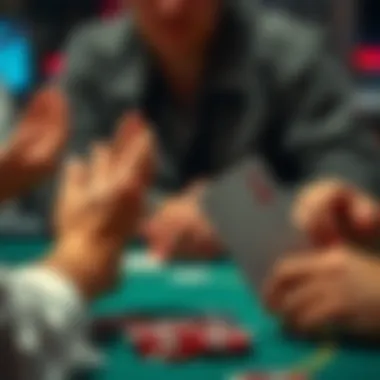
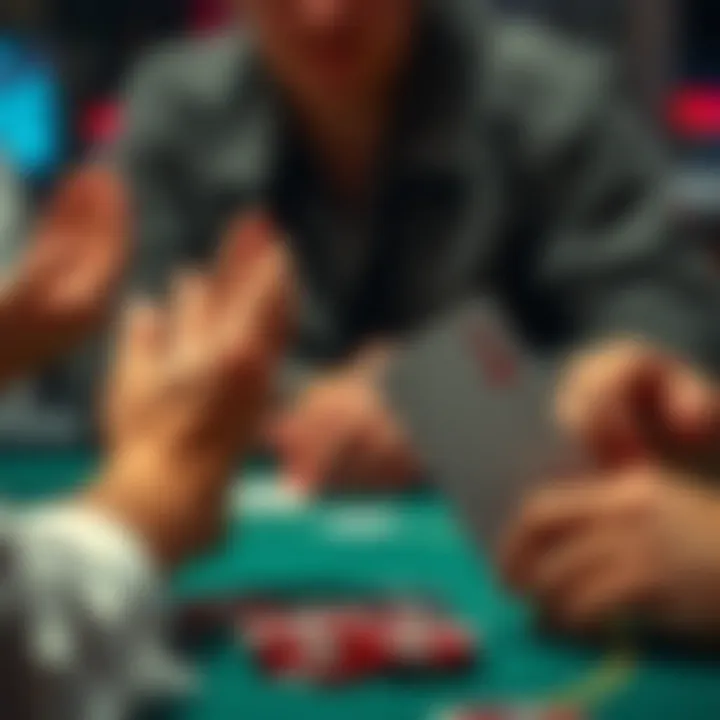
Mucking isn’t just a minor detail in poker; it’s a fundamental strategy that holds weight in the grand scheme of gameplay. The ability to muck effectively can make a life-or-death difference in your chip stack. It can save you from taking unnecessary losses and may even turn the tide of a game if executed at the right moment. Understanding the strategic implications of mucking allows players to hone their decision-making skills, sharpen their instincts, and ultimately improve their overall poker strategies.
Bluffing and the Muck
Bluffing is a dance of deception in poker, and mucking is one of the key moves in this intricate choreography. A successful bluff often hinges on your ability to convince opponents you have a stronger hand than you do. When the time comes to muck, it can serve as a powerful statement. Let's unravel this a bit more:
- Mucking After a Failed Bluff: If a bluff goes sideways and your hand doesn't hold up, mucking might be your best bet. Instead of revealing your weak cards, hiding them safeguards your strategies for future hands. Especially if your opponents are savvy, they'll start piecing together your play tendencies.
- Cementing a Reputation: By mucking rather than showing a losing hand, you build an aura of mystery around your gameplay. This can cause your opponents to second guess their decisions, lending strength to future bluffs.
- Reading the Table: After a muck following a bluff, pay attention to how the table reacts. You might learn a thing or two about their mindset and willingness to call your next bet.
Reading Opponents Through Mucking
Mucking is not solely a personal action; it can serve as an observational tool too. The ability to read opponents through their mucking tendencies can provide invaluable insights. Here are several aspects to consider:
- Timing and Frequency: Observing when and how often an opponent mucks can reveal their strategy. Do they muck frequently in aggressive games? It could suggest a tendency to play conservatively, giving you the edge to exploit that.
- Emotional States: Players often exhibit emotional swings, and mucking can be a reflection of their psychological state. If someone is regularly mucking hands they’ve previously played strongly, it’s worth considering their level of frustration.
- Adjusting Your Strategy: If you learn that certain players tend to muck key hands under pressure, you may want to take calculated risks against them. Knowing when to apply pressure could lead to significant advantages in chip accumulation.
Effective mucking isn’t just about the cards in your hand; it is a mechanism that influences how you play, how your opponents play, and the psychology interwoven in this intricate game.
In sum, the strategic implications of mucking stretch beyond mere card management. They are essential tools for bluffing effectively and reading opponents, allowing players to maintain a competitive edge. Mastering these aspects can be the difference between a good player and a top-tier competitor.
Player Psychology and Mucking
In the game of poker, the interplay between emotions and strategy can’t be overstated. Mucking, whether done voluntarily or otherwise, creates a significant psychological landscape for players. The way a player feels about mucking their hand can influence their performance, decision-making, and overall mental state at the table. Understanding these psychological aspects is vital not just for effective play, but also for building a resilient mindset.
The Emotional Impact of Mucking
When a player decides to muck their cards, it’s not merely a mechanical action; it's an emotional moment. Players can experience a cascade of feelings ranging from relief and liberation to regret and disappointment.
For instance, consider two scenarios: a player who mucks a weak hand after a big bet gets called versus one who mucks a strong hand after a perceived sense of defeat. The first player might feel content, knowing they made the right choice, preserving their chips for a better opportunity. In contrast, the second might grapple with anxiety or self-doubt, wondering if their decision was a mistake. These feelings can even lead to tilt, a state where emotions cloud judgment, further complicating future decisions.
"Mucking becomes a moment of truth; it’s where psychology collides with strategy."
Therefore, recognizing how emotional responses shape mucking decisions can lead to future improvements in gameplay. By reflecting on these feelings post-game, players can identify patterns and enhance their mental fortitude, ultimately leading to greater consistency in performance.
Mucking and Decision Fatigue
Decision fatigue is a silent adversary that many poker players face, often without realizing its impact until it’s too late. The sheer number of choices that players encounter each round can drain cognitive resources, and mucking can be a form of escape, albeit one that might not always serve their best interests. When fatigue sets in, even the most seasoned player might find themselves dumping a hand too quickly.
The implications of decision fatigue can be manifold. Firstly, a player might begin to shrug off their usual diligence in hand assessment. When they’re exhausted from constant decision-making, it becomes tempting to muck hands simply to lighten the cognitive load. This can lead to missed opportunities or incorrect assessments of risk.
To combat this, players should focus on strategies such as:
- Prioritizing Rest: Taking regular breaks during play can help refresh the mind, reducing overall fatigue.
- Clearing the Mental Clutter: Techniques such as mindfulness or even simple breathing exercises can sharpen focus and help maintain proper decision-making ability.
- Establishing Protocols: By creating a systematic approach to deciding when to muck, players can bypass the psychological stress associated with choice overload, leading to better consistency in their gameplay.
By addressing both the emotional terrain and fatigue that accompanies mucking, players can adopt a more trained, rational approach that allows for stronger decision-making amidst the inherent unpredictability of poker.
For more insights into the psychological aspects of betting and decision-making, consider exploring resources like Psychology Today, which offers deeper dives into decision-making processes.
Practical Tips for Utilizing Mucking
Mucking in poker isn’t just a routine action; it’s an intricate part of the strategy that players often overlook. Understanding how to effectively muck can save players not only chips but also their sanity at the table. To enhance your gameplay, let’s delve into the practical tips surrounding mucking that every player—be it beginner or seasoned—should keep in mind.
Best Practices for Mucking Decisions
- Know When to Muck:
Timing is crucial. Players must learn to identify when their hand is no longer favorable. Recognizing the shift in pot odds or understanding your opponents’ tendencies can provide insights on the right moment to fold. When the board reveals cards that are detrimental to your chances, or if an opponent's betting pattern suggests they have a strong hand, those are the moments that warrant a muck. - Be Discreet in Your Mucking:
In a game, the perception of your decisions matters. Mucking can sometimes give opponents clues about your hand strength. It’s not just about the act of discarding; it can be about how you handle that discard. Try to be subtle. Avoid drawing attention to your mucking by maintaining a calm demeanor. This will prevent others from picking up potential tells. - Listen to Your Gut:
There’s a reason why so many poker players describe the feeling they get at the table as the "poker gut.” If something feels off, trust it. Maybe you have a decent hand statistically, but intuition suggesting you could be outplayed should be taken seriously. Recognizing that inner voice can guide you through uncertain scenarios. - Reflect on Mucking After the Hand:
After a session, take time to analyze your mucking decisions. Were they justifiable? Did you muck too often or perhaps should have leaned into a hand? By evaluating these moments, you’ll gain insights into your playing style and how effective your mucking strategy is.
Avoiding Common Mucking Mistakes
- Mucking Out of Frustration:
It’s easy to discard a hand due to previous losses or feelings of disappointment. Avoid mucking out of an emotional response. Take a breather if necessary, and make your decisions based on logic and analysis, not frustration. - Over-Mucking:
Be wary of being too quick to muck. Sometimes situations might appear bleak, only to turn favorable with a card draw. Understand when it's worth sticking with a hand—balancing between playing it safe and taking calculated risks is at the heart of poker. - Ignoring Your Position at the Table:
Your position can drastically affect your decision to muck or fight for a pot. Early positions require more conservative play, while late positions can afford you some risks. Remember that the dynamics at the table shift; always be attuned to how your position affects your approach. - Underestimating Your Opponents:
It's essential not to overlook who you’re playing against. Experienced players may use strategic mucking to manipulate how others perceive them. Keep an eye out for shifting trends in opponents’ playing styles that could influence your own decisions to muck.
Remember, mucking is just as much about making the right decision as it is about preserving your stack. Embrace it as a tool to enhance your overall strategy rather than a sign of defeat.
With a firm grasp on these practical tips, players can elevate their mucking strategy and approach each hand with greater clarity. Mucking isn’t merely an outcome; it’s a deliberate decision that, when handled correctly, can greatly influence the game.
Mucking and Risk Management
Risk management in poker is about weighing potential gains against the losses associated with various decisions. Mucking provides a unique opportunity to cut losses without facing the emotional swings that come from sticking with a suboptimal hand. Recognizing when to muck can preserve a player’s stack and maintain their engagement in the game, rather than being dragged down by a losing hand.
Understanding Pot Odds and Mucking
Pot odds are a crucial concept in poker that directly ties into mucking. Simply put, pot odds reflect the ratio between the current size of the pot and the amount required to call a bet. Players need to assess whether the potential reward justifies the risk of investing more chips in the current hand. When the pot odds suggest that a situation is unfavorable, mucking becomes a viable option.
Consider this: If the pot is $100 and your opponent bets $50, you’re looking at pot odds of 2:1. If you have a hand that is likely to lose based on the current board cards—especially if the odds of completing a straight or flush are slim—mucking is not just a safe play, but a wise one. Decisions like these help players avoid exposing their chips to unnecessary risk, consolidating their resources for more promising opportunities.
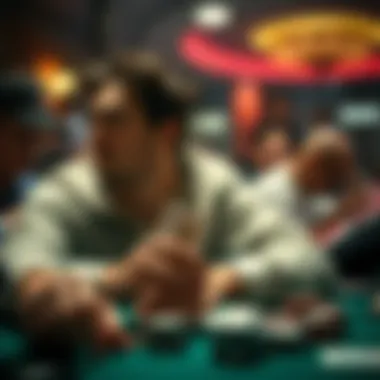
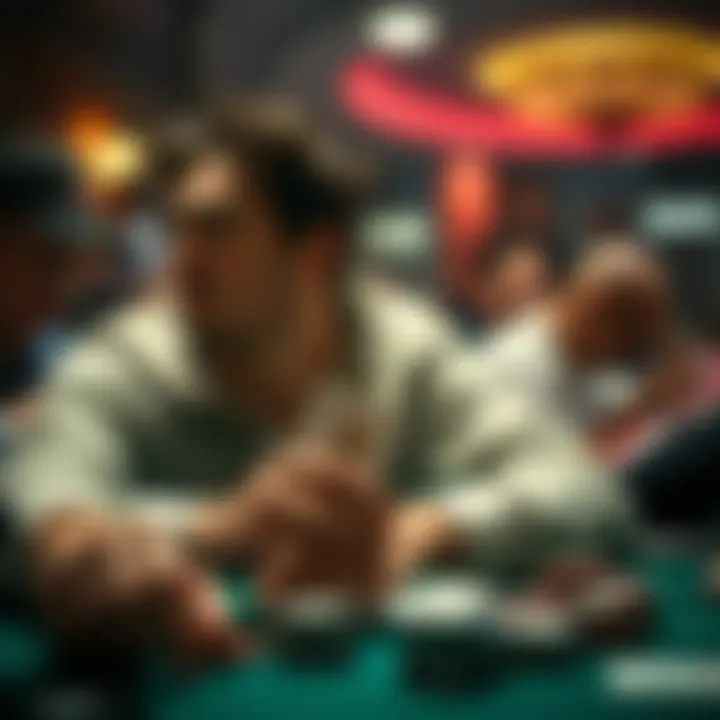
Evaluating Risk: When to Hold and When to Muck
Deciding between holding a hand and mucking it can be intricate and often tense. It involves reading the table, understanding your opponents, and keeping a clear head. One approach to reinforce this decision-making process is to develop a framework that highlights specific scenarios where mucking is preferable.
- Spotting Weakness in Your Hand: If the texture of the board suggests strong hands while you hold a weak one, it might be time to muck. Acknowledging when your hand can’t compete is essential in poker.
- Opponent Betting Patterns: If an opponent's betting patterns suggest strong holdings, folding becomes a strategic action. Recognizing these patterns protects you from tough losses.
- Stack Sizes and Tournament Considerations: In tournament play, your stack size becomes a formidable consideration. If you’re facing all-in bets from larger stacks and your hand isn’t strong, mucking can be a way to preserve your tournament life.
"The key to understanding mucking with regard to risk is recognizing the critical balance between potential rewards and inherent dangers in any given situation."
Moreover, it’s also critical to remember that each decision to muck not only affects the immediate game but can impact long-term strategies as well. Players who avoid unnecessary risks by mucking are likely to have a more sustainable approach to poker over time, ultimately enhancing their overall game.
In the long run, developing a shrewd understanding of mucking in combination with risk assessment can elevate a player's performance. Comprehending when to hold onto a hand and when to release it is an art that grows refined over time, rooted in experience and sound analysis.
Case Studies Involving Mucking
The examination of mucking through case studies serves as a crucial element in understanding its overall impact on gameplay and decision-making in poker. Historical and current examples allow players to see how mucking is not merely a random action but rather a strategic maneuver that can dictate the flow of the game. By analyzing specific instances of mucking, players can glean insights into the reasoning behind these choices, how they resonate within the framework of poker strategy, and what lessons can be learned for future play.
The case studies highlighted below showcase various mucking decisions made in the heat of the moment, emphasizing the multifaceted nature of this action. Such cases help to unravel the complexities involved and ultimately refine a player's approach on the felt.
Famous Mucking Decisions in History
Throughout poker history, there have been noteworthy decisions involving mucking that underscore the significance of the move. One such case is the notorious hand involving Phil Ivey, a player known for his exceptionally calculated gameplay. During the 2009 World Series of Poker, he faced off against Gus Hansen in a high-stakes pot where Ivey held a below-average hand. Instead of risking his chips in a pot where the odds were not favorable, he chose to muck, preserving his stack and setting the stage for a later comeback.
Similarly, consider Daniel Negreanu in a 2015 match against some formidable opponents. In a tense situation, he mucked a strong hand after carefully assessing the dynamics of the table. By doing so, he avoided a potential loss that could have ruined his overall strategy for that game. These decisions demonstrate that mucking is not an admission of defeat, rather a tactical choice rooted in a player's understanding of current game conditions.
Analyzing Professional Players' Mucking Strategies
Professional players often exhibit unique mucking strategies developed from years of experience and understanding of the game's nuances. A closer look at how these experts approach mucking reveals a few consistent themes.
- Timing is Everything: Professional players know when to display strength and when to back down. For instance, a timely muck can be more effective than an ill-timed bluff, leading the table to reconsider a player's future moves.
- Reading the Table: The best players tend to integrate the concept of "reading the room." Ignoring their own hands, they study their opponents. If they sense someone is likely to call their bet, a well-placed muck might save them from a costly confrontation.
- Psychological Warfare: Mucking is not just about the hand in front of you. It is also a way to signal to opponents. A strategic muck can instill doubt in their minds, potentially affecting their future decisions.
Every player has their own unique take on mucking, yet these strategies provide guiding principles that can aid others in refining their own methods. Whether you're a seasoned pro or a newcomer to the game, understanding the history of mucking and the strategies behind it can make all the difference at the table.
"Great poker players are those who can let go of their pride and know when to walk away, even from a good hand."
In summary, the exploration of mucking through case studies reflects its importance as a strategic tool rather than a mere reaction to unfavorable cards. By learning from the decisions of others and integrating successful strategies into personal gameplay, players can enhance their overall poker acumen.
The Future of Mucking in Poker
The realm of poker is not static; it keeps evolving with the winds of time, like a river finding its way through new terrain. Mucking, an often-overlooked part of the game, is poised to follow suit. As players adapt to fresh strategies, the future of mucking reveals itself to be intertwined with various factors, particularly online gaming and technological innovation.
Mucking in Online Poker
The rise of online poker rooms has reshaped how mucking is perceived and used. In a virtual environment, the rules are similar, but the dynamics can change dramatically. Players often find themselves facing an array of opponents from different backgrounds and skill levels. Mucking in online play allows for real-time adjustments in strategy that can be crucial for success.
One must also consider the impact of anonymity; some players may choose to muck more often to conceal their true strategies. This creates a unique psychological space where players can experiment more freely without the fear of being judged by those sitting around a physical table. In essence, mucking in online poker serves both practical and psychological roles. It allows players to hone their skills while keeping their opponents guessing.
- Key Benefits of Mucking Online:
- Encourages flexibility in decision making.
- Offers psychological cover for bluffs and bold plays.
- Provides a low-pressure environment for learning and adapting.
Implications of Technological Advances on Mucking
Technology doesn't just change how we play; it alters our entire understanding of roles within the game. Advanced software programs analyze betting patterns, track statistics, and simulate countless hands. This wealth of data can significantly inform when and how players muck their cards. Flipping through the intricacies of data can help a player recognize a pattern or trend that wouldn’t be apparent in live play. The future suggests potential applications of machine learning algorithms that predict optimal mucking situations based on various player tendencies.
Furthermore, the advent of virtual reality could expand the concept of mucking even further. Imagine a digital poker table, where your virtual avatar interacts with others in a simulated environment, blending the comfort of online play with the social elements present in physical casinos.
"Mucking isn't just about throwing away a hand; it's about the choices we make and the stories our decisions tell in the grand scheme of poker."
In this potential future, the art of mucking could become even more nuanced—existing as a tool for deception rather than merely as a defensive maneuver. As players become more astute, the psychological aspects of mucking could overshadow its mechanical function. A player might decide to muck not just to save chips but to convey a message to their opponents—a bold move in the mental game of poker.
End
The future of mucking in poker lies at the intersection of human psychology and technological innovation. In both virtual and physical arenas, mucking will continue to evolve, driven by the strategies of players and the tools they utilize. As each hand unfolds, the decisions to muck or hold cards will paint a rich tapestry, revealing insights not only about individuals but also about the ever-shifting landscape of poker as we know it.
Finale
The discussion surrounding mucking in poker has brought to light several essential elements that play a pivotal role in a player’s journey at the table. It’s clear that understanding mucking is not just about knowing when to fold but rather encompasses a broader perspective on decision-making and strategic gameplay. Mucking propels the game forward by allowing players to maintain control over their actions and manage their emotional responses.
Final Thoughts on Mucking in Poker
As we wrap up this exploration, the significance of mucking cannot be overstated. Players who grasp its nuances often find themselves at a strategic advantage, allowing them to blend seamlessly into the dynamics of the game. Here are some key takeaways regarding mucking:
- Strategic Flexibility: Mucking facilitates an adaptable strategy, enabling players to avoid potential pitfalls while navigating through varied situations at the poker table.
- Emotional Management: There’s an undeniable psychological component to mucking; the ability to let go of a hand can alleviate stress and help maintain a clear mindset, freeing players from the emotional burdens of attachment.
- Game Readiness: Players should always be prepared to muck proficiently, with an understanding that this act can contribute significantly to their overall poker skill.
For both beginners and seasoned players, mucking serves as a critical skill that, when mastered, can influence the outcome of many hands. By adopting a proper approach to mucking, players can not only improve their own game but also affect how others perceive their play style.
In the face of a constantly evolving poker landscape, recognizing the role of mucking as both a tactical and psychological tool will undoubtedly pay dividends, leading to more thoughtful plays and ultimately better performance in the long haul. For further reading and resources, consider visiting Wikipedia's poker section or engaging with communities on Reddit.
Ultimately, mucking isn't just a footnote; it’s a crucial part of a player’s arsenal. As players keep honing their abilities, the art of mucking will remain a vital component in their quest for mastery in the world of poker.















